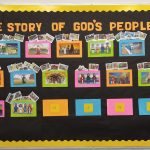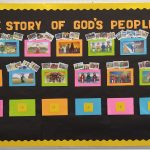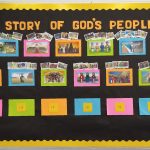If there is one thing that our brethren can do to improve their Bible class program, it is to be more mindful of who is teaching the children. Not all Christians should be teachers. (James 3: 1) Not all teachers have the same ability to teach all ages.
Have you ever tried to put a puzzle together? You know, those big ones with 1000 pieces…little pieces that are very similar but not the same? Trying to put a piece into a puzzle that doesn’t fit just right makes for a very unpleasant fit for the poor little piece being forced into place. It leaves a hole in another section of the puzzle where that piece belongs. And it leaves an extra piece left out of the puzzle altogether. But when all the pieces are put in their proper place, a beautiful picture emerges. It is such a satisfying feeling to put that last piece into the puzzle.
Organizing a Bible class program is like putting together a puzzle. There are a lot of parts – students, classrooms, curriculum, resources, teachers. When the appropriate part is put in its place, the Bible class program works smoothly. Everyone walks away with the satisfying feeling of a job well done. But if one of the pieces is being forced into the wrong place, the overall program is uncomfortable and more of a challenge than is necessary. Each age group has special kinds of needs that require a special kind of teacher. Choosing the right teacher for the class is like putting that last piece in the beautiful puzzle.
The High School / Middle School Class
This class is listed first because it is such an important class. I think the absolute best teachers should be teaching the high school/middle school class. These classes are, for many of our children, the last chance we get to teach them about God. These are the years they begin to be influenced by their peers, their teachers, their co-workers. They begin to question their parents’ beliefs. They are looking for answers. They will soon be able to decide for themselves, even if they have been Christians for years, whether they will follow God on their own.
- This is not the class for a novice Christian to teach.
- This is not the class for someone who has never taught before.
- This is not the class for someone who enjoys stirring up a debate without offering definitive answers from the Bible.
- This is not the class that needs a dry bones lecturer.
- This is the class that needs the very best teacher available.
The high school/middle school teacher should be one who knows God’s word, lives God’s word, can defend God’s word and present God’s word in a way that will interest, excite, and convict the maturing minds of these most important students. He should love his students and be willing to build a relationship with them outside of the classroom. He should be approachable so that any of his students who have a problem feel comfortable going to him for help. If there are enough really good teachers available, this class can benefit from a new teacher every quarter or two, but if there is only one really good teacher in the congregation, this is the class he belongs in. Don’t skimp on the high school class.
The Baby / Toddler Class
The baby / toddler class is the first introduction to a Bible class setting for the youngest of our children. It is not a class where deep theological discussions will be held, but the teacher of this class gets to be the first one to tell the most basic stories – Creation, Noah, Baby Jesus, etc. This is a class where relationships grow and develop that will benefit the babies, the parents, teachers and ultimately the congregation for years to come.
- The teacher of this class needs to love babies. She needs to understand baby development and be able to choose appropriate activities to engage the student. She needs to be aware of the babies’ moods and flexible enough to change her lesson accordingly.
- The teacher needs to commit to more than a quarter. Babies need routine. They need familiar faces. They need a teacher who will commit to at least 6 months of both Sunday and mid-week classes – a year would be better. Constantly switching teachers at this age causes confusion which increases anxiety which leads to bad behavior and a distrust of the Bible class setting.
- The teacher for this class will welcome parents to participate with their babies in the class. This will give the parent the opportunity to learn all the little songs and activities and be able to continue the lesson at home.
- The teacher is not just the baby/toddler class teacher but the teacher of the mommies as well. Encouraging the mommies to love their children just as God instructed in Titus 2:4. What an awesome responsibility! What a privilege!
The Pre-school Class
What a fun age! Everything is new and exciting. The students are a bundle of energy. To meet their needs the teacher must be on top of things. Preparation is key. This is probably the first class where the student is dropped off by the parent. This is the class where behavior expectations are taught and consistently reinforced. Because of this, it is a good idea to keep a regular teacher or two in this class. Changing teachers every quarter can be confusing to the child. Each teacher brings her own teaching styles and expectations of the students. Keeping a couple of consistent teachers will create an atmosphere of confidence in the teacher that will help the student behave appropriately. Future teachers will appreciate the teacher of this class who nurtures the students’ enthusiasm while at the same time teaches proper classroom behavior.
- The teacher must be prepared to spend lots of outside time preparing for class. These students do not read yet so they will depend on the use of visual aids and the teacher’s storytelling ability. This takes practice – lots of practice. Practice using the visual aids prior to class. Practice telling the story prior to class.
- The teacher will encourage worshiping God by teaching the student to pray, to sing and to listen and respond to the Bible story.
- The teacher will be flexible enough to meet the emotions of the students yet consistent and firm enough to encourage the students to learn self-control.
- The teacher will be enthusiastic, energized, and eager. This is a high-energy job. No lazy teacher need apply.
- The teacher will enjoy having a helper in class. This can be a high school student or novice Christian or anyone who loves or want to learn to love this age group. The helper in this class will be the model the students follow. If the helper is actively participating in class, the students will copy her actions, teaching them by example. The helper will also be learning to teach which will be an asset to the congregation for years to come.
The Pre-k / Kindergarten Class / 1st Grade Class
This is always a challenging class. At this age, the students are all over the place with their ability to read, to follow directions, to sit still, to do handwork. The teacher who takes on this challenge needs to be aware of the vast differences her students might have and be willing to present the lesson so all will benefit. The teacher will need to still use many of the teaching techniques as the pre-school teacher does but on a more advanced level. While the students have probably heard the main Bible stories taught to children (Creation, Noah, Baby Moses, Daniel, Jonah, etc.), this will be the first time to really get an understanding of the big picture of the Bible.
- The timeline becomes especially useful. Use it often.
- Introducing basic Bible geography is a good idea. Starting off with basic locations and getting accustomed to how a Bible lands map looks.
- Continuing to teach how to pray but with more of an emphasis on why we pray and how to improve our prayers.
- Teaching the whys and hows of the worship service – singing, Lord’s Supper, giving, etc.
- Encouraging singing hymns that are regularly sung in the worship service. Teaching them how to follow along in a songbook. The young boys can be encouraged to think of themselves as leaders by “leading” a song in class.
The teacher of this class will continue to teach proper Bible class etiquette and encourage respect for the teacher and the other students. Improper behavior should be addressed consistently, firmly, and lovingly. Students at this age aim to please a teacher they respect. They respect a teacher who sets age-appropriate boundaries during class and who gives loving attention outside of class.
The Elementary Class
I save this one for last because it is probably the easiest class to find a teacher for. These students are usually reading well. As they get older, there is less dependency on visual aids which can reduce the amount of outside preparation. As this dependency on visual aids lessens, the need for a teacher who is willing to study the lesson on a deeper level is essential.
- The teacher of this class will be a good Bible student, unafraid of teaching the more challenging Bible stories and making proper applications to the students, willing to spend much time studying, reading, meditating on the lesson.
- The teacher will be eager to answer the many questions, often difficult questions, these students ask. She knows that these students are beginning to think seriously about their relationship with God. She has the wonderful opportunity to teach about salvation.
- The teacher will build a relationship outside of the classroom with her students and be aware that the students are observing her behavior. They will be able to spot someone who is not really all that interested in God’s word – someone who is just doing her time in class.
Many of these students enjoy a workbook type curriculum if it is presented in an enthusiastic manner. There are lots of ways to teach these classes and the students are flexible enough that a new teacher can be brought in every quarter. Having a variety of teachers allows for a variety in the classroom. While some teacher might be big on memorizing lists, another might be good at encouraging singing and another might concentrate on Bible geography. Each of these teachers bring a fresh look and feel to the classroom. While this diversity is good, having the teachers working together can help bring continuity. Without this continuity the students can feel like the lessons are disjointed and unrelated to what they have previously been studying. A regularly scheduled teacher’s meeting or workday can help tremendously keeping teachers informed, motivated and on the same page.
I would like to add a big “hats off” to those who have the responsibility of finding the right teacher for the job – the piece that completes the puzzle. It is a never-ending job but one that is so important to your congregation.
Diana








0 Comments